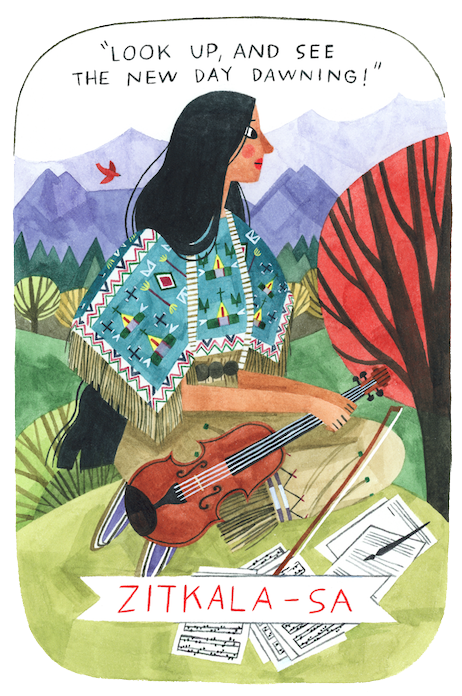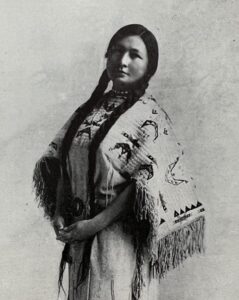
Additional Resources
Zitkála-Šá:,
The Red Bird Activist
1876–1938
“Look up, and see a new day dawning!”
By P. Jane Hafen

Zitkála-Šá, photograph by Joseph T. Keiley.
Gertrude Simmons was born on the Dakota Plains in 1876, the same year as the Battle of the Greasy Grass, also known as the Battle of Little Big Horn. As a Yankton Sioux, she lived her life through the Plains Indian wars, the Boarding School Era, and changing politics to the New Era of Indian Affairs in 1938.
Gertrude is most well known for writing about her young life on the Plains and going to Boarding School. There she was forced to learn English and to change her life into what non-Indians expected of her. Rather than becoming a domestic worker, she took her skills and became a famous writer, musician, and speaker. She gave herself the Lakota name Zitkála-Šá, which means Red Bird. For a while she taught at Carlisle Indian School, the most famous of the Indian Boarding Schools. She turned to writing her own story, collecting her tribal stories, and returned to South Dakota.
While in South Dakota, Gertrude met and married Raymond Bonnin. Together they looked for jobs and eventually moved to Utah where they both worked for the Indian Bureau, the forerunner to the Bureau of Indian Affairs, on the Uintah Ouray reservation. Gertrude felt isolated in Utah, so she worked with the local Ute women, teaching them to sew, to cook, and to budget. In the evenings she and Raymond would have musical gatherings.

William F. Hanson and Zitkála-Šá. Photo courtesy of Harold B. Lee Library, Brigham Young University
Those socials led to her friendship with BYU music professor William Hansen and together they wrote The Sun Dance Opera. Based on Sioux rituals and melodies, the opera combined local trained singers and tribal members who would sing traditional and sacred songs. They traveled around Utah and gave a number of performances.
In 1911 a group of former Boarding School students formed the Society of American Indians. From many different tribes across the United States, they worked together to influence politics and fight for rights for Indians. Gertrude wrote about working in Utah for their magazine. She and Raymond moved to Washington D. C., where she became the magazine’s editor and Raymond worked for the Army in World War I.
Among her editorial writings, Gertrude campaigned for citizenship for American Indians, especially the Indian soldiers who fought in the war. After the war she continued her battle for Indian citizenship. She was supported by General Federation of Women’s Clubs on the East coast and in California. In 1924 the American Indian Citizenship Act was passed, although some states such as Utah, took a long time to extend the right to vote to Indians.

Zitkála-Šá as President of the National Council of American Indians.
Gertrude fiercely fought against the use of peyote. Unfortunately, that battle led to sharp divisions among her associates with the Society of American Indians. She and Raymond also fought for land and treaty rights. In 1926 they formed the National Council of American Indians to represent tribal nations before Congress. Gertrude served as NCAI president. She was also involved in investigating crimes against Indians in Oklahoma in the 1920s. After the passage of the Indian “New Deal” in 1934, Raymond prepared legal claims under the Indian Claims Act. Those claims were settled for the Consolidated Ute Tribes in Utah and Colorado in 1951, after Gertrude and Raymond’s passing.
Gertrude helped raise her four grandchildren in Washington, D.C. while her son Ohiya lived in Roosevelt, Utah. She passed away in 1938 and had a Mormon funeral. She and Raymond are buried in Arlington National Cemetery. She left a legacy of telling the Indian Boarding School experience and of standing up for Indian Rights.
P. Jane Hafen (Taos Pueblo) is a Professor Emerita from the University of Nevada, Las Vegas.
Read more about American Indian voting rights in Utah here. Many of Zitkála-Šá’s records are at BYU’s special collections library, highlighted in this blog post. And stay tuned – Zitkála-Šá is being honored on a quarter in Fall 2024!

